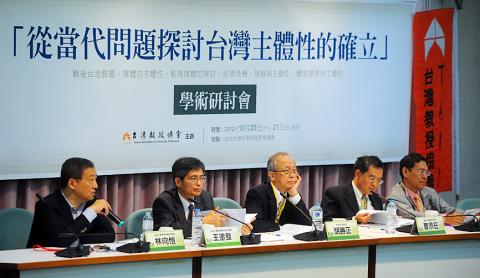Government efforts launched last month to stimulate the economy lack any clear results and GDP might still contract or grow at a rate of less than 1 percent, economists said yesterday.
National Taiwan University economics professor Kenneth Lin (林向愷) said he did not believe President Ma Ying-jeou (馬英九) could make good on his promise to make economic progress within the month — which would be up on Wednesday — despite a rise in exports last month and a lowering of the unemployment rate.
The rise in exports last month was primarily due to the Chinese need for petrochemical and information-technology products, and it also shows that Taiwan’s export products are prone to fluctuation.

Photo: Wang Min-wei, Taipei Times
Pointing to the Ma administration’s promise to “feel improvements in the economy” last month, Lin said he did not see how the people “felt” anything except the continued increase in unpaid leave, short-term and irregular workers, and the continued stagnation of Taiwan’s average wages.
Lin said there were still more than 3 million people with monthly wages below NT$30,000 (US$1,000), adding: “I’m sure if someone made a poll on whether economy had improved, they would say: ‘What improvements?’”
National Taipei University economics professor Wang To-far (王塗發) also said Taiwan saw a 4 percent decrease in its exports this year, totaling NT$220 billion between January and last month.
There’s no way anybody would “feel” an upturn with those kind of figures, Wang said, adding that the nation’s GDP also did not do well in the first quarter, and contracted in the second quarter.
There have not been any constructive economic policies in the past month aside from the “complicated and nigh incomprehensible Economic Power-up Plan,” Wang said.
Commenting on the government’s trumpeting of a rise in exports last month, Wang said rise was seasonal, because the month usually saw high exports in the run-up to Christmas.
The rise in exports did not necessarily point to an increase in Taiwan’s total GDP for the year, Wang said, adding that this year’s GDP would likely “be below 1 percent.”
Wang also said that the Ma administration “didn’t understand economics,” saying that it was impossible to perceive economic problems within a month, much less fix them.
Meanwhile, in a seminar hosted by the Taiwan Association of University Professors (TAUP), attending economists all warned that the “Ma administration’s economic opening-up policy was a mistake.”
Lin said that Taiwan had no lack of talent and funding, but despite that, the Ma administration insisted on introducing Chinese talent and investment in Taiwan on a large scale.
Lin said that was an attempt by the administration to use “ally with China to rule Taiwan” methods when the nation was beset with problems, tying Taiwan and China closer together.
Wang also said Taiwan’s know-how was migrating into China at a rapid speed because more than 70 percent of Taiwanese investments were concentrated in countries with less sophisticated methods and technology.
This has turned Taiwan-China relations from mutual aid into competition, Wang said, adding that Taiwan should lessen its trade dependency on China and strive to keep ahead in the technology sector.

Chinese Nationalist Party (KMT) Chairman Eric Chu (朱立倫), spokeswoman Yang Chih-yu (楊智伃) and Legislator Hsieh Lung-chieh (謝龍介) would be summoned by police for questioning for leading an illegal assembly on Thursday evening last week, Minister of the Interior Liu Shyh-fang (劉世芳) said today. The three KMT officials led an assembly outside the Taipei City Prosecutors’ Office, a restricted area where public assembly is not allowed, protesting the questioning of several KMT staff and searches of KMT headquarters and offices in a recall petition forgery case. Chu, Yang and Hsieh are all suspected of contravening the Assembly and Parade Act (集會遊行法) by holding

PRAISE: Japanese visitor Takashi Kubota said the Taiwanese temple architecture images showcased in the AI Art Gallery were the most impressive displays he saw Taiwan does not have an official pavilion at the World Expo in Osaka, Japan, because of its diplomatic predicament, but the government-backed Tech World pavilion is drawing interest with its unique recreations of works by Taiwanese artists. The pavilion features an artificial intelligence (AI)-based art gallery showcasing works of famous Taiwanese artists from the Japanese colonial period using innovative technologies. Among its main simulated displays are Eastern gouache paintings by Chen Chin (陳進), Lin Yu-shan (林玉山) and Kuo Hsueh-hu (郭雪湖), who were the three young Taiwanese painters selected for the East Asian Painting exhibition in 1927. Gouache is a water-based

Taiwan would welcome the return of Honduras as a diplomatic ally if its next president decides to make such a move, Minister of Foreign Affairs Lin Chia-lung (林佳龍) said yesterday. “Of course, we would welcome Honduras if they want to restore diplomatic ties with Taiwan after their elections,” Lin said at a meeting of the legislature’s Foreign Affairs and National Defense Committee, when asked to comment on statements made by two of the three Honduran presidential candidates during the presidential campaign in the Central American country. Taiwan is paying close attention to the region as a whole in the wake of a

OFF-TARGET: More than 30,000 participants were expected to take part in the Games next month, but only 6,550 foreign and 19,400 Taiwanese athletes have registered Taipei city councilors yesterday blasted the organizers of next month’s World Masters Games over sudden timetable and venue changes, which they said have caused thousands of participants to back out of the international sporting event, among other organizational issues. They also cited visa delays and political interference by China as reasons many foreign athletes are requesting refunds for the event, to be held from May 17 to 30. Jointly organized by the Taipei and New Taipei City governments, the games have been rocked by numerous controversies since preparations began in 2020. Taipei City Councilor Lin Yen-feng (林延鳳) said yesterday that new measures by